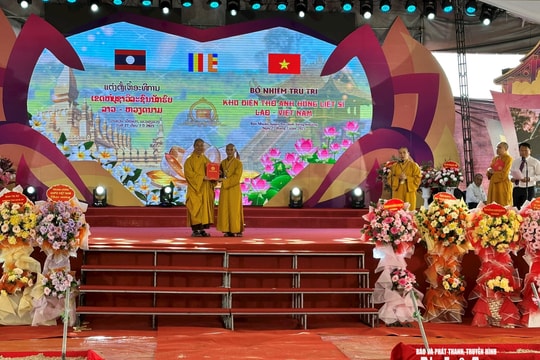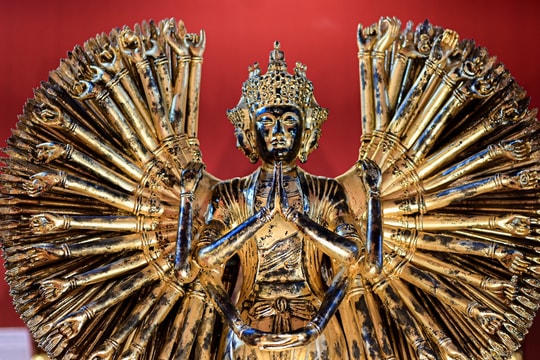Need to understand correctly the activities in the temples
(Baonghean) - There are many new activities appearing in pagodas recently that are often not necessarily related to Buddhist practices. That partly shows the pagoda's concern for social issues, but it also needs to be re-examined, in order to keep the pagoda's activities from going too far beyond the Buddhist function.
Trying to "sow fate" into the young generation
In recent years, Buddhism in the North has tended to follow the movement and seasonal activities of society. From organizing prayers for wealth and fortune at the beginning of the year to organizing ancestor worship ceremonies... And now, when the high school graduation exam and university entrance exam are approaching, many pagodas such as Ha Pagoda, Dai Tue Pagoda (Nam Dan), Nguu Tu Pagoda (Thanh Chuong), Duc Hau Pagoda, Diec Pagoda (Vinh City), Hong Phuc Pagoda (Nghi Loc)... organize prayers, advice and support for exam season for candidates. These activities also receive many different opinions from interested people.
Some people think that it is good that the temple always accompanies the children of the homeland in their studies. However, many people also express concern and worry when the temple increasingly organizes activities that are not related to religious practice or distort the cultural values that have been associated with it for thousands of years. It can be said that this is a sensitive issue, related to the spiritual life and beliefs of many people, so it needs to be perceived objectively and needs many opinions to discuss to find appropriate voices in the current context.
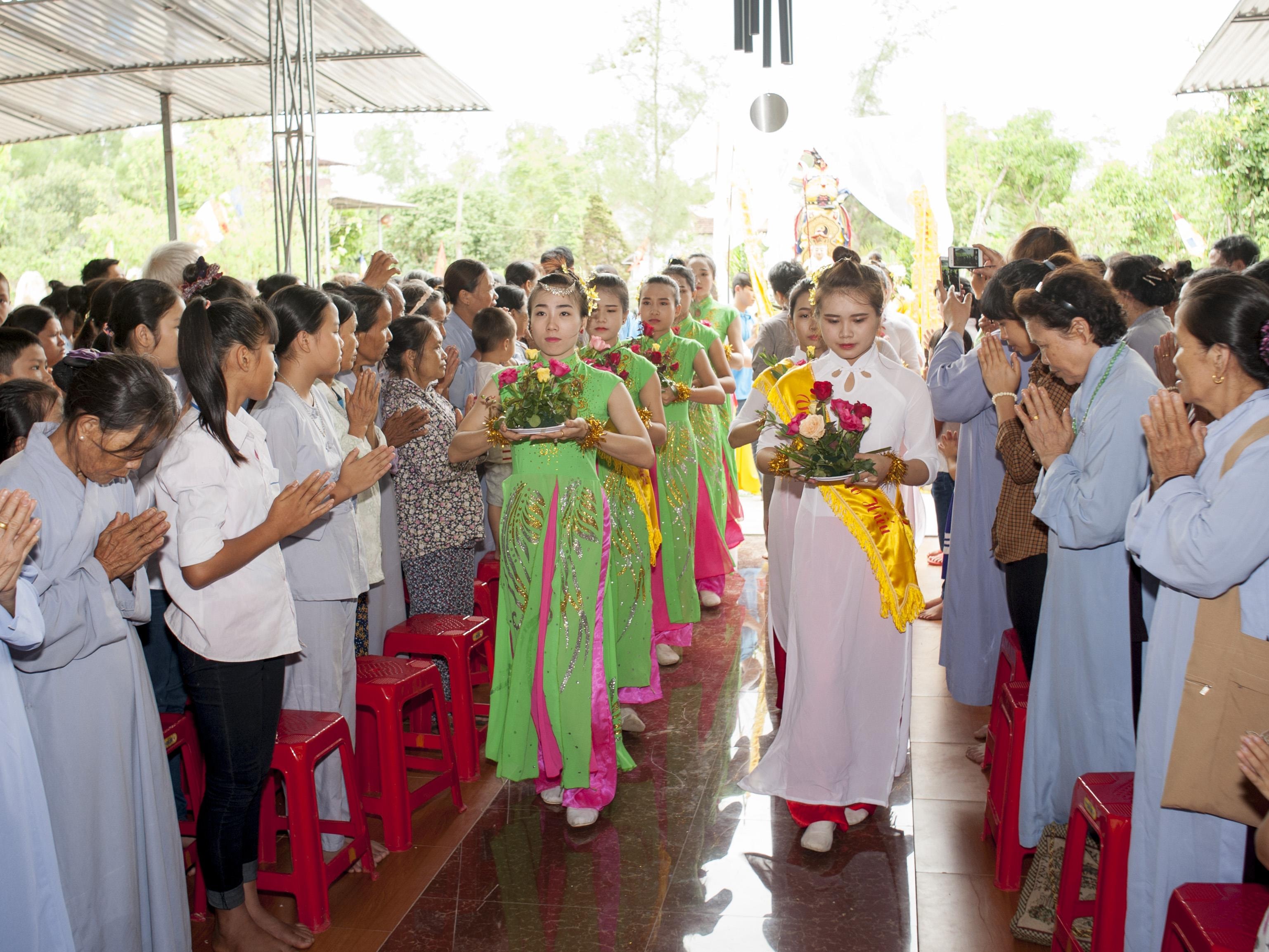 |
| Vu Lan ceremony at a pagoda attracts many female Buddhists. Photo: Thanh Cuong |
The temple is also a place to hold ceremonies and activities related to the religious life of Buddhists or those who believe in Buddhism. To be exact, this is a specific religious space. Therefore, the temple is often associated with a peaceful, quiet, and quiet space, and is often built in mountainous areas with few people for the convenience of practitioners. The quietness of the temple is that when Buddhists enter the temple, they feel secure, peaceful, and less bustling with daily life. Basically, the activities of the temple are associated with Buddhism.
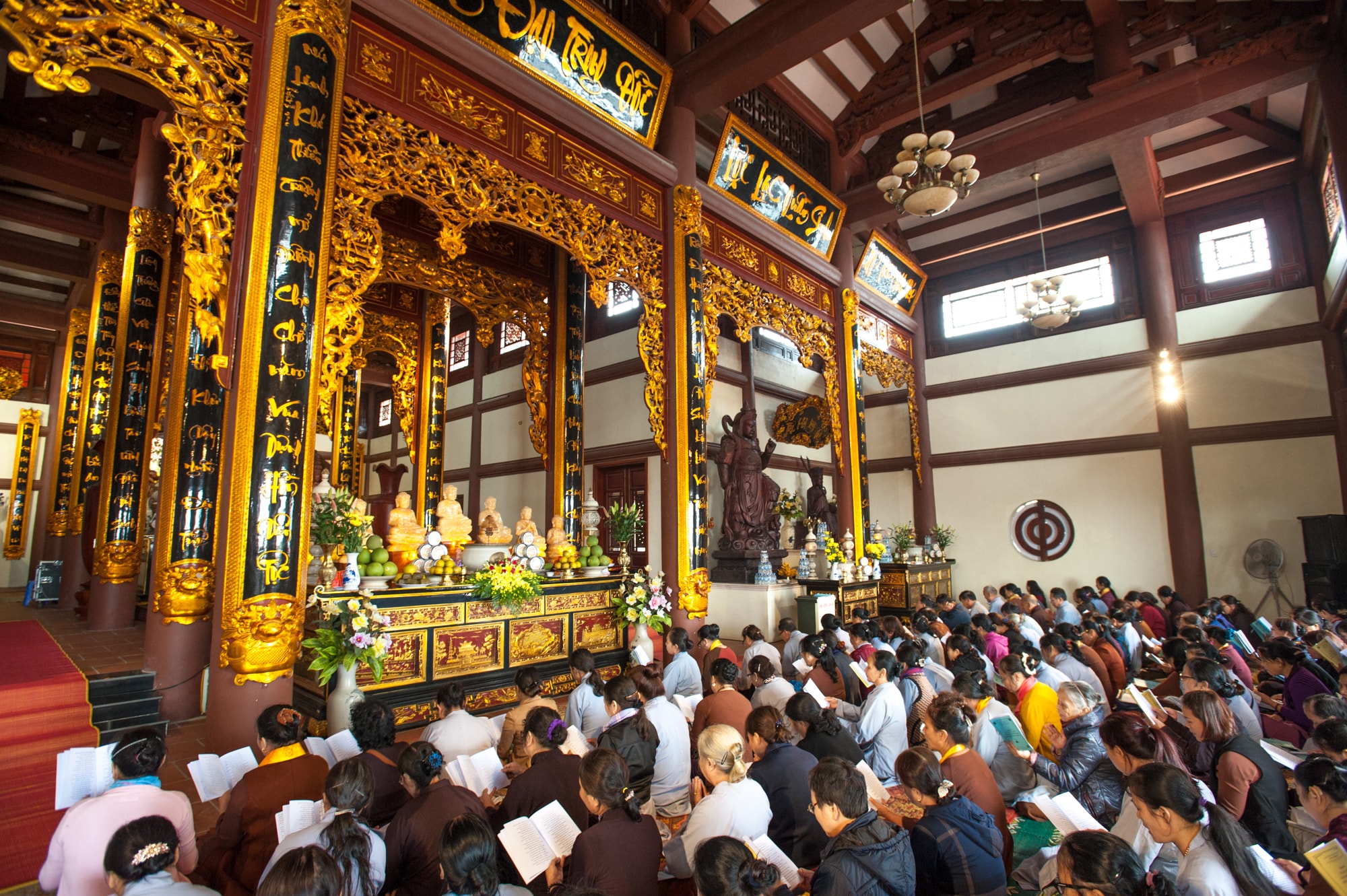 |
| Buddhists from all over the world attended a ceremony. Photo courtesy of Thanh Cuong |
In the current context, the secularization of Buddhism is even more evident. The pagoda, in a unified system through the Vietnam Buddhist Sangha, is always associated with political, cultural and social activities in the locality as well as the general situation of the whole country. That is also the reason why recently, many pagodas have organized activities other than practicing Buddhism such as organizing the death anniversary of Hung Kings, organizing prayers, supporting students...
On the positive side, these activities are reflected in a number of aspects. First, it is the concern of monks and nuns in the temple for national culture and the lives of local children. Second, through these activities, the psychology of students and their families can be more relaxed, more secure and confident during the exam process or when facing troubling events. Third, through these activities, people can also be more attached to the temple and Buddhism, which, as Dr. of Cultural Studies Dang Hoang Giang calls, the temple is trying to "sow affinity" in the young generation, creating good Buddhist affinity.
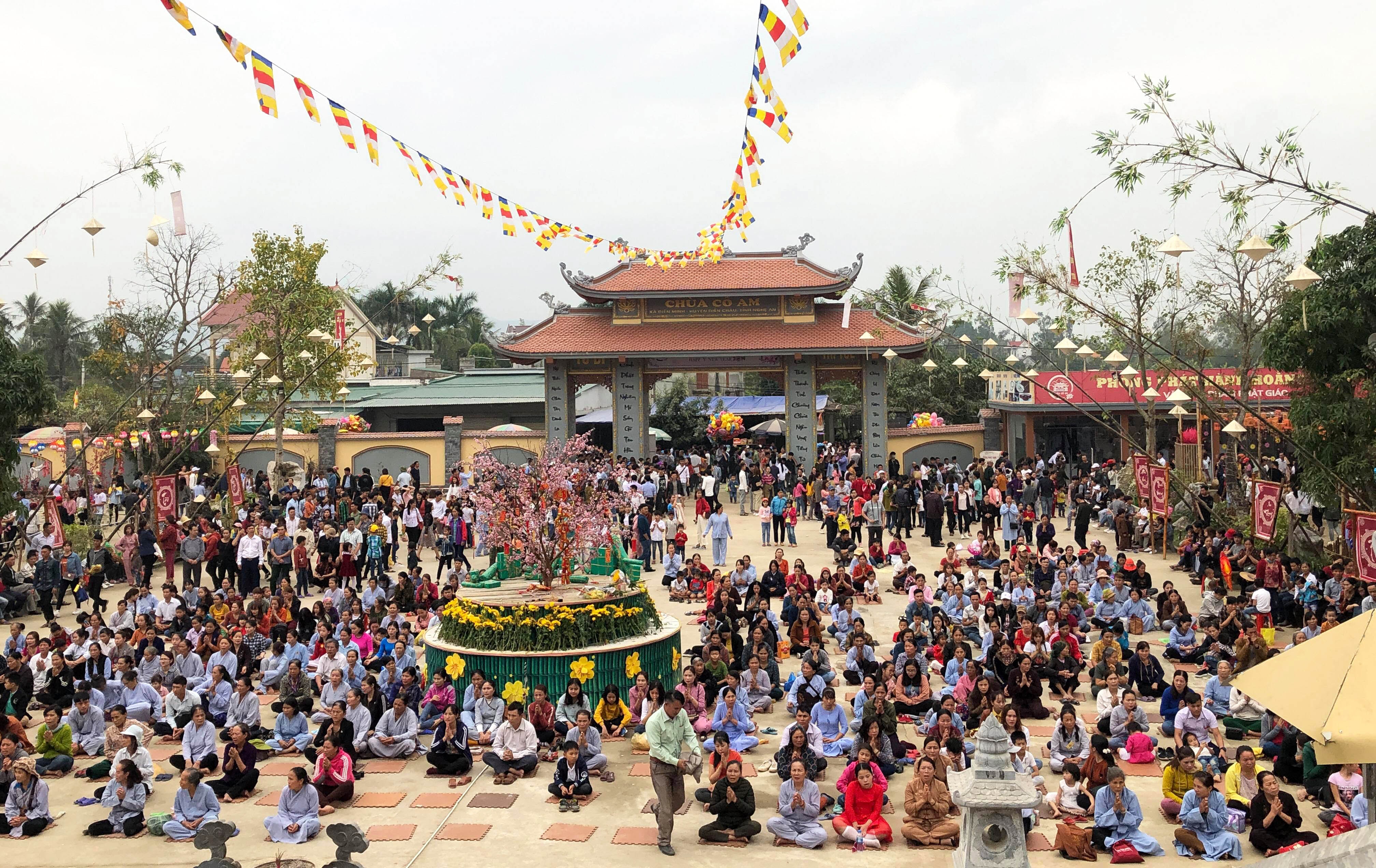 |
| Every year at the beginning of Spring, Co Am Pagoda holds a peace praying ceremony. Photo courtesy of Huy Thu |
Need to preserve cultural values
But besides that, we also need to be aware of the negative aspects of these activities. That is, bringing pragmatic views and pragmatic spirit into religious life, changing the cultural values that religion has shaped over thousands of years.
As Dr. Dang Hoang Giang warned, these activities, if encountered by people who are too superstitious, can form rituals to ward off bad luck and pray for good luck for candidates before taking exams, and sometimes even become service-oriented activities on this issue. If this happens, it will have a negative impact on the temple, Buddhism and people's lives. It also easily creates a mentality of praying for luck, "luck - bad luck" for some candidates when they lack confidence in themselves.
It is also important to note that when temples attach too much importance to these activities, it will affect the practice as well as activities related to Buddhism, which are the basic functions of temples. It will be more dangerous when temples consider these activities to attract tourists and people to temples, just like historical sites and tourist areas organize activities to attract visitors. We should clearly understand that people going to temples to burn incense and pray (personal activities) is different from temples organizing lucky prayers for students (activities of temples - a religious organization). The more important temples attach to these activities, the more obvious the negative aspects become.
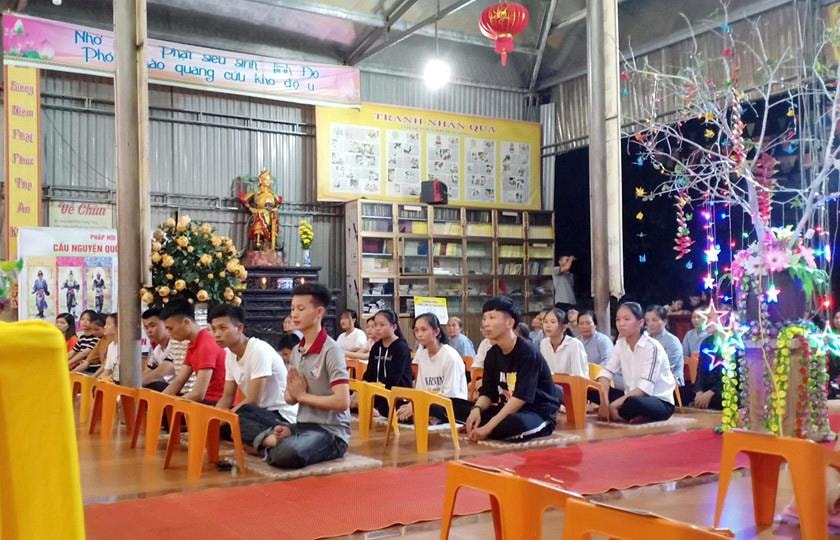 |
| Students listen to exam season advice at Ha Pagoda. Photo courtesy |
In short, every issue has two sides of its value. The same is true for pagodas organizing activities that have little to do with practicing Buddhism in the pagoda. But in the case of organizing activities such as praying for luck or supporting students during exam season, the benefits do not outweigh the harm. Pagodas and Buddhism are part of the national culture, always accompanying the nation. Therefore, pagodas and monks linking their activities with the locality and accompanying the people in the area is a good thing, and should be done.
But choosing which activities to conduct requires careful consideration of the functions of the temple and the monks. Why not return the temple to activities related to Buddhism, related to the spirit of the Buddha? It could be organizing courses on religious practice, lectures on filial piety, tolerance, and love for humanity for the young generation. Thereby, sowing good karma for many people, guiding young people to form healthy faith, believe in themselves, in good things and the cause and effect of good karma, which the Buddha always wanted to convey to sentient beings.

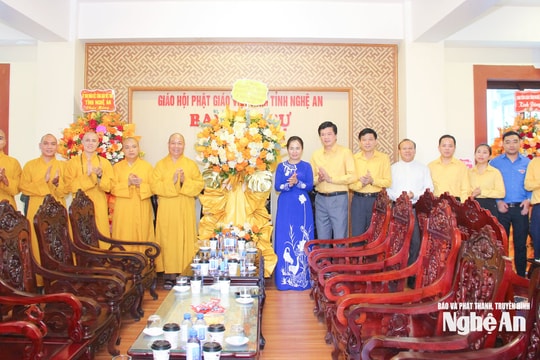
.jpg)
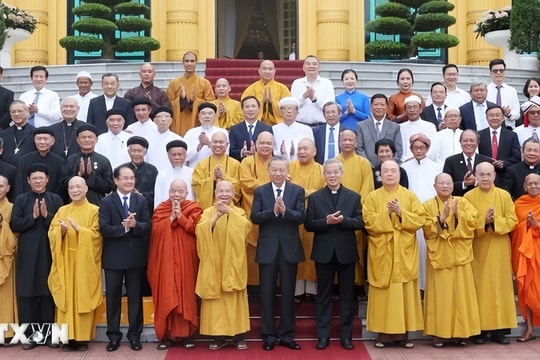
.jpg)
